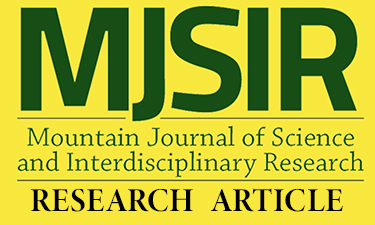Development and Evaluation of Task-Based Material in Business Mathematics for Senior High School
Main Article Content
Abstract
Instructional material development is vital in filling the gap in the learning needs of students. Many research found that using varied instructional materials contributes to better student achievements. This study focused on developing and evaluating a task-based material to be used by Grade 11 students in the Accountancy Business and Management strand. This research analyzed the validity and readability of the developed task-based material in Business Mathematics employing the descriptivedevelopment method. The task-based material was evaluated along content, face, presentation and organization, and accuracy and up-to-dateness of data. The developed task-based material has high validity index in terms of content, face, presentation and organization, and accuracy and up-to-dateness of data. In terms of the readability test, the material is fairly easy to read and comprehensible to at least Grade 5 students. It is recommended that the material be subjected to pilot testing, vetting, approval, and intellectual property right application.
Article Details
References
Al-Shareef, S.Y. (2012). Task-based language teaching. https://www.slideshare.net/Sa345mar/taskbasedlearning14703475?next_slideshow=1
Andaya, J. (2014). Factors that affect Mathematics achievements of students of Philippine Normal University - Isabela Campus. Journal of Arts, Science and Commerce, 5(4), 83-91. https://www.academia.edu/31093039/FACTORS_THAT_AFFECT_MATHEMATICS_ACHIEVEMENTS_OF_STUDENTS_OF_PHILIPPINE_NORMAL_UNIVERSITY_ISABELA_CAMPUS
Bolstad, R., & Gilbert, J., (2012). Supporting futureoriented learning & teaching — a New Zealand perspective. https://nicspaull.files.wordpress.com /2017/03/bolstad-et-al-2012-nz-future-oriented-07062012.pdf
Castillo, G. (2012). Task-Based Learning. Slideshare. https://www.slideshare.net/reijinakashi1/taskbased-learning-15416587
Center for Occupational Research and Development. (2012). Instructional material development. Research Net. https://www.researchate.net/publi cation/238548288_Materials_Development_ and Research--Making_the_Connection
Chingos, M., & Whitehurst, G. (2012). Choosing blindly: Instructional materials, teacher effectiveness, and the common core. Brown Center on Education Policy. https://www.brookings.edu/wp-content/uploads/2016/06/0410_curriculum_chingos_whitehurst.pdf
Dickey, J. (2012). Task-based language learning. Slideshare. https://www.slideshare.net/RobertDickey/tblllessonanningnextslideshow=6.
Education Technology. (2014). Task-based learning. https://www.slideshare.net
Fathet, S., & Chirachaimongkhonkhun, C. (2012). Task-based instruction. https://www.slideshare.net/NickoroEN48/tbi-complete2
Ferguson, S. (2009). Teachers’ use of Mathematics tasks: The impact on the Mathematics learning and affective responses of low-attaining upper primary students. https://www.semanticscholar.org/paper/Teachers'-Use-of-MathematicsTasks-%3AThe-Impact-on-Ferguson/fec0f46fa566eaeb153771bd00fc2ecdd8408ce3
Formato, T. (2010). Task-based learning. Share Net. https://www.share.net/Patrmartin/task-basedlanguage-teaching-formato-2010
Gutfreund, H., & Rosenberg, Y. (2012). Knowledge and training of secondary school Mathematics teacher. http://yozma.mpage.co.il/Index4/Entry.aspx?nodeId=1110&entryId=20726
Krohn, R. (2015). Mathematics in the first century classroom: The power of pulled learning. https://www.researchgate.net/publication/27700942The_Teaching_and_Learning_of_MathematicsPractices_in_the_21st_Century_Empowering the_Need_to_Change
Macaraeg, M. (2014). Development and Validation of Game-Based Lessons in Science and Health. International Scientific Research Journal, 1(1). http://webcache.googleusercontent.ncom/search?q=cache;U-kF1p4Z01sJ
Marbas, J. (2017). The Importance of Instructional Materials. Academia. https://www.academia.edu/8704377/THE_IMPORTANCE_OF_INSTRUC TIONAL_MATERIALS
Mbuaga, Z.K., Kibet, K., Muthaa, G.M., & Nkonke, G.R. (2012). Factors contributing to students' poor performance in Mathematics. American International Journal of Contemporary Research, 2(6), 87-91. https://www.aijcrnet.com/journals/Vol_2_No_6_June_2012/11.pdf
McKenna, M.C., & Doughtery-Stahl, K.A. (2015). Assessment for reading instruction. The Guilford Press. https://vdoc.pub/documents/assessmentfor-reading-instruction-third-edition-5jcefqekrhk0
Mouraz, L., & Leite, C. (2013). Putting knowledge in context curriculum contextualization in History classes. Teaching and Learning Journal, 6(3), 65-82. https://www.kpu.ca/sites/default/filesTeaching%20and%20Learning/TD.6.3.12_Mouraz%26Leite_Putting_knowledge_in_context.pdf
National Academic Press. (1997). Content Standards, Curriculum, and Instruction. https://nap.nationalacademies.org/read/5788/chapter/6
Philippine Government. (2013). Republic Act No. 10533 (Data file). https://www.officialgazette.gov.ph/2013/05/15/republic-act-no-10533/.
Pamukkale University. (2017). Education before graduation. http://www.pau.edu.tr/moe/en.
Rolka, C. & Remshagen, A. (2015). Showing up is half the battle: Assessing different contextualized learning tools to increase the performance in introductory Computer Science courses. International Journal for the Scholarship of Teaching and Learning, 9(1), 1-18. https://files.eric.ed.gov/fulltext/EJ1134661.pdf
Suan, J. (2014). Factors Affecting underachievement in Mathematics. Proceedings from Global Summit on Education GSE. Kuala Lumpur, Malaysia.
Tawil, S. (2013). Education for “Global Citizenship”: A Framework for discussion. UNESCO Education Research and Foresight (ERF) Working Papers Series 7, Paris: UNESCO.
Yardley, S., Teunissen, P.W., & Dornan, T. (2012). Experiential learning: AMEE Guide No. 63. Med Teach, 34(2), 102-115. https://doi.org/10.3109/0142159x.2012.650741

